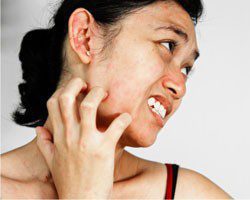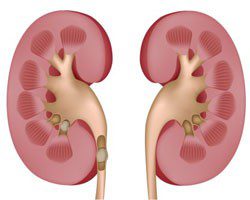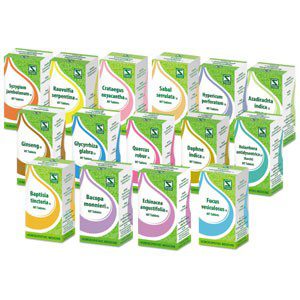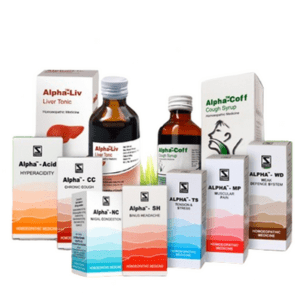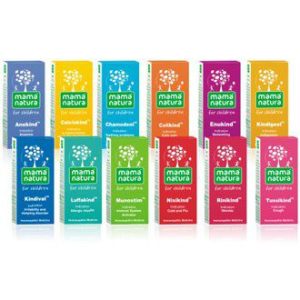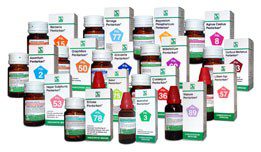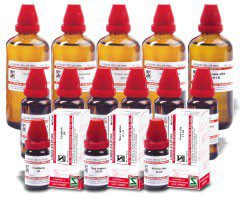Doctors Zone
Journal (JEBH)
Alpha™- Liv Drops
Alpha – Liv Drops Due to high demand from the market, for a formulation in drops for the liver, apart from the syrup already available in the market, Schwabe India developed this product. Introduction The liver plays a key role in metabolism. It has anabolic and catabolic, exocrine and endocrine functions. The liver is a blood reservoir, filter and store of different substances (e.g. glycogen, vitamins). It is the site of serum protein (e.g. albumin, prothrombin, fibrinogen) and enzyme synthesis. Metabolic processes (e.g. bilirubin, hormone, carbohydrate and lipid turnover) and the removal of toxic products are important liver functions. 1 Hepatotoxins (e.g. alcohol, tetracycline, acetaminophen, fungal toxins, and anabolic steroids) can cause specific damage to liver cells. Toxic hepatitis may be clinically silent or severe enough to lead to the rapid development of hepatic failure. Clinical features include hepatomegaly, enzyme abnormalities, fever, abdominal pain, anorexia, nausea, vomiting and weight loss. In patients with underlying cirrhosis, manifestations of portal hypertension may predominate. Aversion to fatty food, abdominal discomfort, nausea and vomiting after meals may be symptoms of 2 cholelithiasis. Jaundice results from accumulation of bilirubin. It has non-hepatic as well as hepatic causes. Hyperbilirubinaemia may be due to abnormalities in the 3 formation, transport, metabolism or excretion of bilirubin. TM Alpha -Liv Drops aids recovery and normalisation of liver functions. Severe liver disease needs specialised treatment. Indications: Slow liver functions, fatty liver, and for supportive treatment of hepatocellular jaundice and toxic liver damage.

Klimaktolan – Menopausal Problems – Cardiac Palpitation, Pruritis – Schwabe India
Schwabe News :: Volume 6 | Issue 7-9 | July – September 2015
Product watch
Klimaktolan
INTRODUCTION
Menopause or final menstruation marks the end of reproductive fertility in women. It is preceded by hormonal changes over ten years or more as oestrogen (main female hormone) concentrations gradually decline and follicle stimulating hormone concentration increases. Depending on the overall health of the ladies, the menopause may set in between 44-50 years of age. Symptoms are erratic bleeding in respect to frequency, duration, consistency and quantity of flow. The symptoms are also associated with psychological behaviour, which can vary, and become so intense as to require medication. The period of declining infertility and hormonal alteration around menopause is known as climacteric.
The acute symptoms of hormonal alteration include, vasomotoric symptoms such as hot flushes, vertigo, attacks of perspiration, headache, organic symptoms such as vaginal dryness, breast atrophy, urethritis, incontinence and frequent urinary tract infection; and mental symptoms include tiredness, loss of libido, irritability and depression. Many of these problems are being successfully managed by homoeopathic medicines. The long term symptom or effect of menopause is bone-resorption and increased risk of cardiovascular diseases. Hormone replacement therapy carries lots of side effects and therefore should be limited to exceptional conditions. Klimaktolan offers an effective alternate therapy for management of the symptomatic complex of menopause.
Indications: Menopausal symptoms such as hot flushes, cardiac palpitation, dizziness, depression, pruritis, restlessness, attacks of perspiration and sleep disorders.
Composition:
Each tablet of 250 mg contains:

Cimicifuga racemosa 2x 25 mg
Sepia officinalis 2x 25 mg
Ignatia amara 3x 25 mg
Lachesis mutus 5x 25 mg
Sanguinaria canadensis 2x 25 mg
Excepients Q.S. to make 250 mg
Proven action for the individual ingredients in the sphere of claimed action:
Cimicifuga racemosa : It is indicated for pain in the ovarian region, nervousness and depression. It covers arthralgic, myalgic and neuralgic symptoms like pain, irritability and sleep disturbances.
Sepia officinalis: It is indicated for hot flushes, perspiration and weakness during menopause, bearing down sensation, and patient likes to cross legs or press vulva to support and in painful coitus. It also covers yellow leucorrhoea, prolapse of uterus, depression, sleep disturbances and irritability.
Lachesis mutus : It is suited for climacteric troubles like palpitation, flushes of heat, headache, fainting, menses too short or feeble and painful.
Ignatia amara : It is indicated for irregularity in menses in terms of flow and consistency, changing moods and psychological sadness, spasmodic pain are covered by this drug.
Sanguinaria canadensis : It is suited for headaches, offensive menses, corrosive leucorrhoea, soreness of breast, hot flushes, palpitation and tachycardia.
Abstract of the recent research on the similar product Klimaktoplan
Please refer under ‘Research news’.
Dosage: Unless otherwise prescribed by the physician, 1 to 2 tablets, 3 times per day over an extended period of time. If complaints are not relieved, consult a specialist.
Side effects: No side effects of Klimaktolan are known.
Contra-indications: No contra-indications for the use of Klimaktolan are known.
Interactions: No interactions between Klimaktolan and other products are known.
Presentation: 40 tablets in blister pack of 4×10
Recent Advancements in Basic Homeopathic Research – A Report on Two Significant Publication
In a study conducted at the Experimental Farm of the State University of Santa Catarina, Brazil, researchers investigated the impact of homeopathic treatments on piglets during the nursery phase. The study aimed to determine whether homeopathic agents could reduce fighting behavior, improve growth performance, and affect hematological, metabolic, and oxidative variables. The study included 108 weaned piglets divided into four groups: a negative control group receiving only the basal diet, and three groups receiving different homeopathic treatments at varying dosages.
Journal of Evidence Based Homeopathy Volume: 1, Issue: 1, January - June 2023
Comprehensive articles

Agrohomeopathy – A Review
Short cases

Unmasking the Intricacies: A Pyogenic Abscess Case Report

Lichen Simplex: A Singular Case Study

Ranula Unveiled: A Case Report and Management Approach

Lichen Simplex: A Singular Case Study

A Puzzling Presentation: A Case Report of Jaundice
Recent provings and updated materia medica

Acidum Formicum

Mygale

Thea Chinensis
Materia medica on phytohomeopathy

Chrysarobinum

Sanguinarinum nitricum

Thiosinaminum
Mother tincture

Asparagus Officinalis

Ginkgo Biloba

Rosmarinus Officinalis
Product watch

Alpha™- Liv Drops

Good Morning™ Constipation Drops

Zauber™ Hair Drops
Research News










